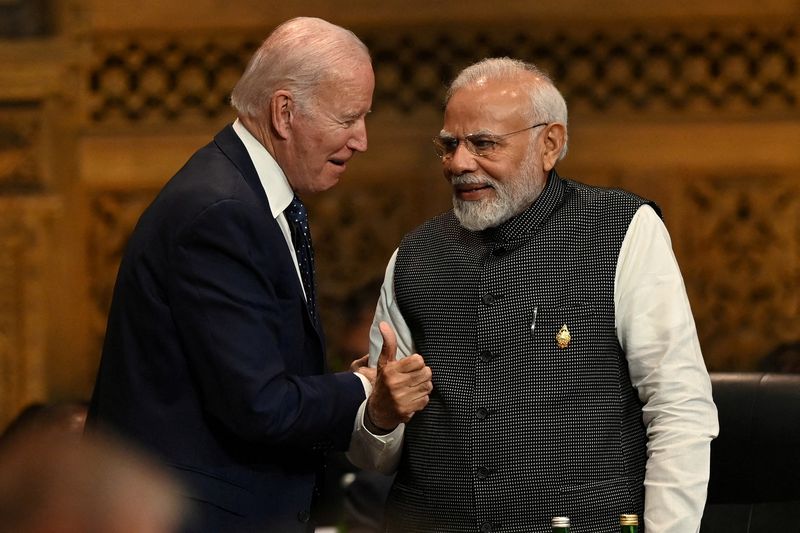
© Reuters. FILE PHOTO: United States President Joe Biden speaks with Indian Prime Minister Narendra Modi during the opening session of the G20 Summit in Nusa Dua, Bali, Indonesia, Tuesday, November 15, 2022. PRASETYO UTOMO/ G20 Media Center/Handout via REUTERS THIS PICTURE WAS S
By Trevor Hunnicutt
WASHINGTON (Reuters) – The White House on Tuesday launches a partnership with India that President Joe Biden hopes will help the country compete with China on military equipment, semiconductors and artificial intelligence.
Washington wants to deploy more Western mobile phone networks in the subcontinent to counter Chinese Huawei technologies, welcome more Indian computer chip specialists to the United States and encourage companies from both countries to collaborate on military equipment such as artillery systems.
The White House faces an uphill battle on every front, including US restrictions on the transfer of military technology and visas for immigrant workers, as well as India’s longstanding dependence on Moscow. for military equipment.
Biden’s national security adviser, Jake Sullivan, and his Indian counterpart, Ajit Doval, are meeting with senior officials from both countries at the White House on Tuesday to launch the U.S.-India Initiative on Critical and Emerging Technologies.
“The broader challenge posed by China – its economic practices, its aggressive military moves, its efforts to dominate the industries of the future and control the supply chains of the future – has had a profound impact on thinking in Delhi,” he said. Sullivan said. .
Doval will also meet with Secretary of State Anthony Blinken during his three-day visit to Washington DC, which ends Wednesday.
New Delhi has frustrated Washington by participating in military exercises with Russia and increasing the country’s purchases, a key source of funding for Russia’s war in Ukraine. But Washington has held its tongue, pushing the country on Russia while tolerating India’s more hawkish stance on China.
On Monday, Sullivan and Doval participated in a Chamber of Commerce event with business leaders from Lockheed Martin Corp (NYSE:), Adani Enterprises and Applied Materials Inc (NASDAQ:).
Although India is part of the Biden administration’s flagship Asian engagement project, the Indo-Pacific Economic Framework (IPEF), it has opted out of joining negotiations on the trade pillar of the IPEF.
The initiative also includes a joint effort on space and high-performance quantum computing.
General Electric (NYSE:) Co, meanwhile, is seeking US government permission to produce jet engines with India that would power Indian-operated and produced aircraft, according to the White House, which says a review is in progress.
New Delhi said the US government would quickly consider General Electric’s request and that the two countries would focus on joint production of “key items of mutual interest” in defence.
The two countries also established a quantum technology coordination mechanism and agreed to set up a working group with the Indian Semiconductor Mission, the India Electronics Semiconductor Association (IESA) and the US Semiconductor Industry Association (SIA). ) to promote the development of semiconductor ecosystems.
India’s space program will work with NASA on manned spaceflight opportunities and other projects, the Indian statement said.
